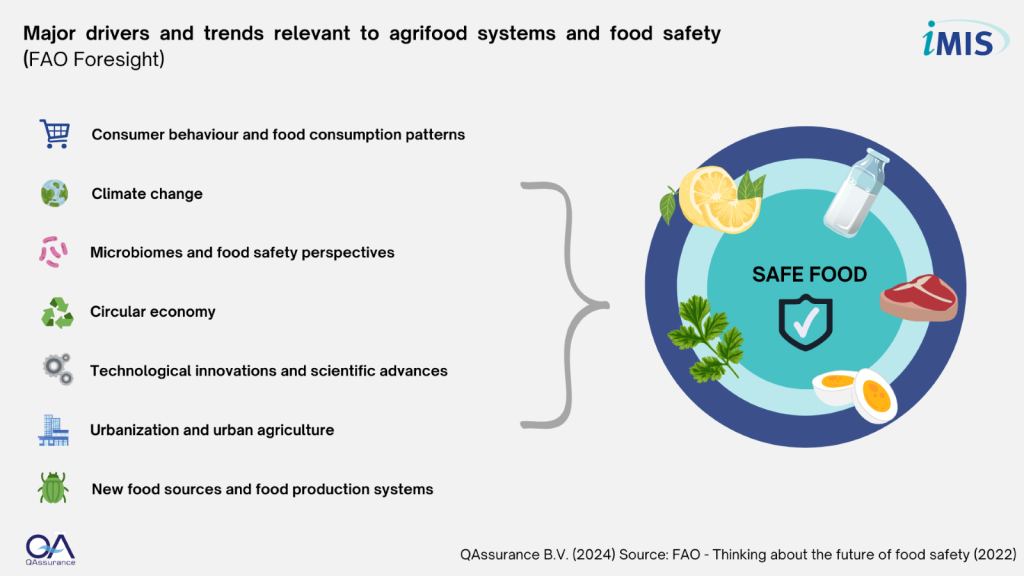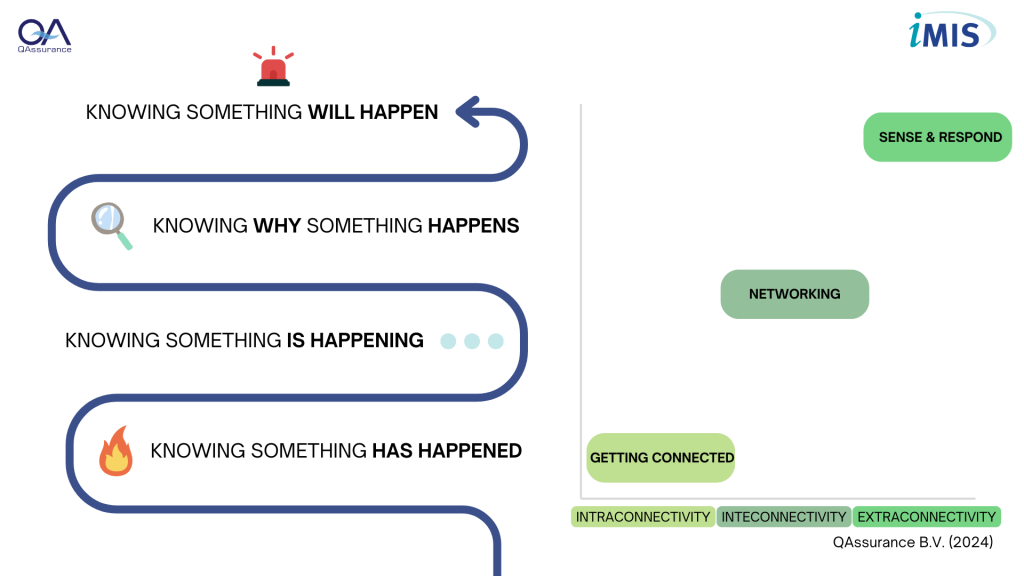Introduction
The global food industry faces a dual challenge: stricter regulations and a rapidly transforming food supply chain. These pressures have exacerbated a critical shortage of skilled food safety professionals, leaving companies struggling to maintain compliance, manage risks, and adapt to change. This talent gap can lead to increased food safety incidents, higher costs, and hindered growth.
Furthermore, traditional reliance on external audits and certifications is no longer sufficient. To thrive, food businesses must proactively build internal expertise, empowering teams to anticipate and address risks.
This article explores these challenges and the limitations of relying solely on external verification. It emphasizes the importance of fostering internal expertise and highlights how solutions like iMIS Food can equip teams with the knowledge and tools needed to navigate the complexities of modern food safety.
Emerging Challenges in the Food Chain
Food safety is crucial for agrifood systems to deliver safe food and address food insecurity. In 2022, the FAO released a Foresight report examining the future of food safety, highlighting the rapid transformation of food chains aimed at providing safer, more affordable, healthier, and more sustainable diets for everyone. This transformation, however, is also causing significant shifts in food chain systems and food safety [5]. The FAO report offers an overview of major global drivers and trends, along with their implications for the food chain and food safety (Figure 1).

A Closer Look at Stringent EU Regulations
Recent years have seen an increase in the stringency and complexity of regulations worldwide, with the European Union (EU) leading the charge. This surge in legislative activity reflects a growing prioritization of consumer protection, environmental concerns, and the need to adapt to emerging risks.
While precise figures on the number of new food laws vary, the European Commission estimates that over 200 pieces of legislation directly or indirectly affect the food chain in the EU. This includes regulations on food hygiene, labeling, additives, contaminants, and more.
Recent Examples of Stricter EU Food Safety Regulations:
- Maximum Residue Levels (MRLs): The EU has revised and tightened MRLs for various pesticides and contaminants in food products, reflecting growing concerns about their potential health and environmental impacts.
- Food Contact Materials (FCMs): New regulations have been introduced to control the use of certain chemicals in FCMs, such as bisphenol A (BPA), due to potential health risks.
The Talent Gap in Food Safety Management
The stricter regulatory environment and evolving landscape have exacerbated a pre-existing problem: a shortage of qualified food safety and quality managers.
Surveys conducted by industry associations consistently highlight the difficulty of finding and retaining qualified professionals. The European Federation of Food Science and Technology (EFFoST), for instance, has identified a skills gap in food safety management as a key concern for the industry [4].
The impacts of staff and skills shortage for food businesses:
- Increased Risk – Struggle to comply with regulations and standards, potentially leading to incidents and recalls
- Higher Costs – Scarcity of skilled people drives up salaries and recruitments costs
- Slowed down Growth – Inability to expand or launch new products due to the lack of in-house expertise
The Illusion of Safety: Limitations of Certification
While third-party audits and certifications (like FSCC 2200, IFS, BRC, etc.) are important for food safety, they’re not perfect. Certification approaches often focus on checking if the right steps are written down, rather if they’re actually effective. This can lead companies to feel overly safe and hide real problems [1].
Instead of just depending on outside checks, companies should take charge of their own food safety management.
Why are third-party audits not 100% reliable?
- Conflict of interest
- Snapshot in time
- Limited Scope
- Human error
Case Studies: Certified, Yet Food Safety Compromised
Several high-profile incidents have occurred at companies that held GFSI certifications [1]:
- 2018 E. coli Outbreak at Chipotle: Despite holding a GFSI certification, Chipotle experienced a multi-state E. coli outbreak linked to contaminated romaine lettuce
- 2017 Listeria Outbreak at Blue Bell Creameries: Blue Bell, another GFSI-certified company, faced a listeria outbreak that resulted in three deaths and a nationwide recall [1]
Beyond Technical Skills
To succeed in today’s challenging food chain landscape, quality managers must adopt a “learning organization” approach. This approach goes beyond simply meeting regulations, focusing instead on proactive problem-solving, continuous improvement, and open communication across the company (Figure 2).
By staying informed about internal and external factors, managers can quickly identify and address emerging risks, fostering a resilient and adaptable food safety culture [2].

Essential Skills of a Modern Food Safety (and Quality) Manager
- Leadership: Inspiring and motivating the team to prioritize food safety
- Communication: Ability to communicate effectively with the whole organization
- Adaptability: Adjusting to new challenges and changes
- Strategic Vision: Thinking ahead and sets long-term goals
- Problem Solving: Using data to find and fix problems, prevents them from happenign again
- Extraconnected Approach: Understanding how everything in the company, and outside of it, affects food safety [2; 3]
The Future of Food Safety Management
Even though the food industry faces tough challenges, this time of change also brings exciting new possibilities. Technology, data analysis, and automation can help solve the problem of not having enough skilled workers, make food safety better, and make work easier. By using these new tools and ways of doing things, companies can deal with today’s problems and get ready for a successful future.
Empowering Teams and Food Companies with iMIS Food
iMIS Food is an easy-to-use platform that simplifies food safety, empowering your team to learn and improve on the job. With iMIS Food, your companies do not need to hire expensive experts – even those with limited experience can quickly become confident in managing food safety and meeting regulations.
Benefits of iMIS Food:
- Bridging the skills gap – Empowers teams of all skill levels to quickly learn and apply food safety management best practices, reducing the need to hire experts
- Proactive risk management – Supports teams to proactively identify and adress potential risks before they become major problems, going beyond simple compliance
- Adaptability – The platform can be tailored to the specific needs of each company, regardless of its size or complexity
- Cost-effectiveness – Helps companies reduce costs associated with hiring, training, and managing food safety professionals
IMIS Food Helpdesk
The iMIS Food Helpdesk is your dedicated support system for all your food safety needs. Our expert team is ready to answer questions, troubleshoot issues, and provide tailored guidance. Learn more about how we can support your food safety journey.
Conclusion
The challenges facing the food industry are undeniable, but so are the opportunities for growth and innovation. By embracing holistic solutions, like iMIS Food, companies can turn these challenges into stepping stones towards a more resilient, efficient, and profitable future. It’s time to move beyond simply reacting to problems and instead proactively build a culture of continuous improvement, where food safety is not just a priority but a core value.
Sources
- [1] Albersmeier, F., Schulze, H., Jahn, G., & Spiller, A. (2009). The reliability of third-party certification in the food chain: From checklists to risk-oriented auditing. Food Control, 20(10), 927–935. https://doi.org/10.1016/j.foodcont.2009.01.010
- [2] Food System Resilience within a Learning Organization – Ir. Cornelis van Elst,1 * John T. Hoffman2 and Carl C. J. Unis3 https://www.nxtbook.com/nxtbooks/trilix/fpt_20220708/index.php#/p/338
- [3] International FoodSafety and Quality Network. (z.d.). The Prerequisite Qualities of a FoodSafety Leader. International FoodSafety And Quality Network. https://www.ifsqn.com/forum/index.php/blog/25/entry-98-the-prerequisite-qualities-of-a-food-safety-leader/
- [4] The European Federation of Food Science and Technology – EFFoST. (z.d.). EFFoST. https://www.effost.org/default.aspx
- [5] Thinking about the future of food safety | FAO. (z.d.). https://www.fao.org/family-farming/detail/en/c/1640159/
Related articles to The Food Safety Skills Gap: How to Empower Your Team
Many customers and visitors to this page 'The Food Safety Skills Gap: How to Empower Your Team' also viewed the articles and manuals listed below:
